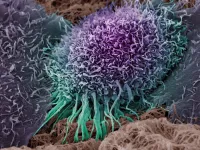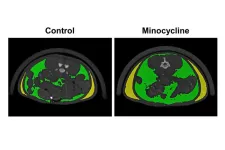(Press-News.org) NEW YORK, NY (March 13, 2023)--A new study by Columbia University researchers suggests that cholesterol-lowering drugs called statins have the potential to reduce heart disease in people with obstructive sleep apnea regardless of the use of CPAP machines during the night.
CPAP (continuous positive airway pressure) therapy improves sleep quality and reduces daytime fatigue in people with obstructive sleep apnea. But based on findings from several recent clinical trials, CPAP does not improve heart health as physicians originally hoped.
Alternative methods to reduce heart disease in sleep apnea patients are urgently needed, because the condition is known to triple the risk of having a heart attack, stroke, or another serious cardiovascular event.
Statins (a class of cholesterol-lowering drugs) may be one such method, according to the new study, led by Sanja Jelic, MD, associate professor of medicine at Columbia University Vagelos College of Physicians and Surgeons.
The study included 87 people with recently diagnosed obstructive sleep apnea who were being treated with CPAP. The patients were randomized to receive treatment with either statins or a placebo.
The researchers found that statins, but not CPAP, protected blood vessels against dangerous inflammatory changes that occur in people with the condition.
The researchers looked specifically at the CD59 protein, which keeps inflammation in check when stabilized in the blood vessels. A previous study by Jelic’s team showed that CD59, which protects cells against complement (a group of proteins that promote inflammation) activity, is more stable when cholesterol is low. Among study participants, CD59 was stabilized after four weeks of cholesterol-lowering statin therapy, but not with CPAP alone.
“The effect we found with statins is important,” says Jelic. “Inflammation in the blood vessels is a key step in progression of cardiovascular disease, so anything that we can do to stabilize CD59 in these patients is likely to be beneficial for heart health.”
CPAP increases levels of inflammatory protein
The researchers also found that CPAP, surprisingly, increases levels of angiopoietin-2, another protein associated with inflammation and heart disease. Elevated angiopoetin-2 is commonly seen in patients on mechanical ventilation but had never been documented among people using CPAP. In the study, statins lowered angiopoetin-2 levels in patients with obstructive sleep apnea.
“We still believe CPAP is very useful, since it improves sleep and reduces daytime fatigue,” Jelic says. “But CPAP also seems to have negative effects on the cardiovascular system. We need to investigate whether we should use more conservative airway pressures or other less-utilized treatments like oral appliances to treat patients with obstructive sleep apnea.”
Before physicians consider using statins to prevent heart disease in their sleep apnea patients, however, clinical trials are needed to confirm that patients using statins will have fewer heart attacks and strokes in the long term, Jelic says.
Currently, statins are prescribed for only 8% to 13% of patients with obstructive sleep apnea.
More information
The study was published on March 13 in the Annals of the American Thoracic Society.
The paper is titled, “Statins Restore Endothelial Protection against Complement Activity in Obstructive Sleep Apnea: Randomized Trial.”
The other contributors (all from Columbia University) are: Riddhi Shah, Neha Patel, Memet Emin, Yeliz Celik, Alondra Jimenez, Su Gao, Jared Garfinkel, and Ying Wei.
The authors declare no financial or other conflicts of interest.
The study was funded by grants from the National Heart, Lung, and Blood Institute (R01HL106041 and R01HL137234), the American Heart Association, and the American Academy of Sleep Medicine.
END
Statins may reduce heart disease in people with sleep apnea
2023-03-13
ELSE PRESS RELEASES FROM THIS DATE:
New process could capture carbon dioxide equivalent to forest the size of Germany
2023-03-13
New research suggests that around 0.5% of global carbon emissions could be captured during the normal crushing process of rocks commonly used in construction, by crushing them in CO2 gas.
The paper ‘Mechanochemical processing of silicate rocks to trap CO2’ published in Nature Sustainability says that almost no additional energy would be required to trap the CO2. 0.5% of global emissions would be the equivalent to planting a forest of mature trees the size of Germany.
The materials and construction industry ...
City or country living? Research reveals psychological differences
2023-03-13
Living in the country, in rural areas, has long been idealized as a pristine place to raise a family. After all, open air and room to run free pose distinct advantages. But new findings from a University of Houston psychology study indicate that Americans who live in more rural areas tend to be more anxious and depressed, as well as less open-minded and more neurotic. The study also revealed those living in the country were not more satisfied with their lives nor did they have more purpose, or meaning in life, than people who lived in urban areas.
The ...
A potential new target for head and neck cancer immunotherapy
2023-03-13
Researchers at University of California San Diego School of Medicine and Moores Cancer Center at UC San Diego Health have identified a strong association between the product of a gene expressed in most cancers, including the most common type of head and neck cancer, and elevated levels of white blood cells that produce antibodies within tumors.
The findings, published in the March 10, 2023 issue of PNAS Nexus, suggest a potential new target and approach for cancer immunotherapies that have thus far produced mixed results for certain head and ...
Impact of Covid-19 pandemic on incidence of long-term conditions in Wales
2023-03-13
A population data linkage study using anonymised primary and secondary care health records in Swansea University’s SAIL Databank has revealed that in 2020 and 2021, fewer people in Wales were being diagnosed with long-term conditions than expected.
Diagnosis rates increased over the two-year period but for most conditions, they still lagged behind expectations at the end of 2021 implicating a potential backlog of undiagnosed patients who are unlikely to be receiving systematic monitoring and management for their conditions.
The study was led by researchers ...
Risk of death for people with dementia increases after a hurricane exposure
2023-03-13
Previous studies of hurricanes have shown general increases in mortality but little has been known about how mortality following hurricane exposure may differ among older adults living with dementia.
Their increased risk could be due to disruption of normal routine, such as access to caregiving, changes in living environment, loss in access to medications, and change in daily routines, said study first author Sue Anne Bell, assistant professor at the U-M School of Nursing.
The analysis focused on risk for mortality among people ...
Cherenkov color imaging shows promise in enhancing radiation therapy effectiveness
2023-03-13
Cherenkov imaging is a valuable cancer treatment tool that can help doctors track and monitor radiation doses received by tissues during cancer therapy in real time. This imaging technique works by detecting Cherenkov radiation, which is emitted by tissues exposed to high-energy radiation, such as X-rays or electron beams from a linear accelerator. As high-energy charged particles from the incident radiation pass through biological tissue, either as primary or secondary radiation, they interact with the electromagnetic fields of the atoms and molecules in the tissue. These soft collision-type interactions ...
Abnormal biomarkers associated with obesity are identified in very young Latino children, study finds
2023-03-13
In the United States, low-income, Latino youth are disproportionately affected by obesity with 25.8% of Latino youth aged 2-19 considered to have obesity, which is approximately two times more likely when compared to their non-Latino white counterparts. A higher level of obesity results in an increased risk of cardiometabolic diseases, which are a group of related diseases caused by an unhealthy lifestyle and/or an increased genetic predisposition.
A new study by Allison McKay, RDN, department manager for the Department of Nutrition and Food Studies, identified elevated insulin, hemoglobin A1C, triglycerides, and other cardiometabolic ...
People should have right to shape marine environmental decisions
2023-03-13
Government and political institutions should do more to make citizens feel empowered within marine environment decisions and give them the right to participate, new research shows.
Marine Citizenship is the term used for people who get involved in changing how humans use the ocean. It has been investigated as a potential policy tool to engage the public in marine environmental issues through a new study by the University of Exeter and the University of Bristol Law School.
Despite efforts to tackle human causes such as overfishing, marine litter, microplastics, pollution, ocean acidity, global warming and climate change, there ...
New targets for CAR-T cell therapy against acute myeloid leukemia through AI-assisted analysis
2023-03-13
Unlike other forms of blood cancer, acute myeloid leukemia (AML) cannot currently be treated with CAR-T cell immunotherapy. The reason is that specific molecular targets with which certain immune cells could specifically target AML cells are lacking, which would permit the immune system to attack cancer. Two research teams of Professor Dr. Sebastian Kobold with Dr. Adrian Gottschlich from the Division of Clinical Pharmacology at LMU University Hospital Munich and Dr. Carsten Marr with Moritz Thomas from the Institute of AI for Health at Helmholtz Munich have now ...
The fat tax: Long-term, systemic antibiotic use for the treatment of adolescent acne can promote fat accumulation
2023-03-13
A growing body of evidence is showing that the healthy gut microbiome – a community of microorganisms that live together in the gut – influences many aspects of human growth and development, especially during adolescence. While there are many physiologic changes during this time, one of the most outward facing, and sometimes distressing, is the development of acne.
Most individuals treat their acne with topical therapies; however, around 25% of adolescents require systemic antibiotics, such as minocycline, to help to alleviate symptoms and clear up the skin. These systemic antibiotic ...




